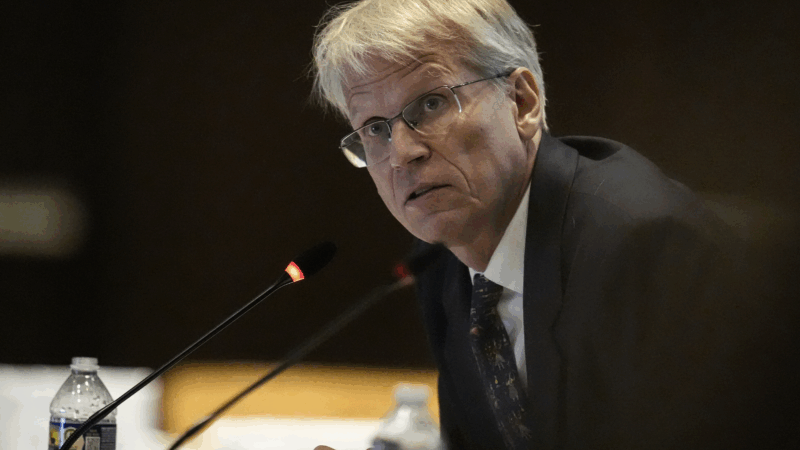Expert panel picked by RFK Jr. will scrutinize the vaccine schedule for kids
In its first meeting with an entirely new roster in place, a federal panel that helps craft vaccine policy in the U.S. revealed its plans to scrutinize the safety of the childhood vaccine schedule and other priorities that reflect longstanding concerns for Secretary of Health and Human Services Robert F Kennedy Jr.
The Advisory Committee on Immunization Practices, or ACIP, kicked off its two-day meeting on Wednesday morning at the Centers for Disease Control and Prevention headquarters in Atlanta.
The committee of independent experts, which offers recommendations to the CDC on the nation’s vaccine schedule and immunization policy, has recently become a flashpoint.
Earlier this month, Kennedy booted all 17 members of the existing panel, who’d been appointed by President Joe Biden, and replaced them with a smaller selection of his own, including several who’ve gained a following for, at times, promoting misleading and inaccurate information on COVID-19 vaccines.
New workgroup will examine the vaccine schedule for kids
The meeting began with Martin Kulldorff, an epidemiologist formerly at Harvard Medical School who is now serving as the ACIP chair, calling for the need to “rebuild public trust” in federal health institutions in the wake of the pandemic and what he called the “inflated promises” about the COVID vaccines and mandates.
In that vein, he said ACIP would establish a new workgroup to study and evaluate the cumulative effects of the recommended vaccine schedule, including the “interaction effects between different vaccines, the total number of vaccines, cumulative amounts of vaccine ingredients and the relative timing of different vaccines.”
“The number of vaccines that our children and adolescents receive today exceed what children in most other developed nations receive and what most of us in this room received when we were children,” Kulldorff said.
Older vaccines will get another look
Another new workgroup will look specifically at “vaccines that have not been subject to review in more than seven years,” he said. Topics they will take up include the universal recommendation to administer the hepatitis B shot on the day of birth; how children are immunized against measles, mumps, rubella and varicella, or chicken pox; as well as the timing of the measles vaccine to resolve religious objections among some parents.
These new areas of focus are already making some who study vaccines nervous about the future direction of ACIP.
“They’re signaling interest in revisiting long-settled questions around vaccine safety, opening up issues that have been focal points of critics of vaccines for decades and giving them the legitimacy that comes with this previously well-respected government advisory committee,” says Jason Schwartz, associate professor at the Yale School of Public Health.
Kennedy’s unprecedented decision to purge ACIP hinged on his claims that conflicts of interest have compromised the committee, though NPR has found that a government report Kennedy often cites to make his case doesn’t back this up.
Along with Kulldorff, Dr. Robert Malone — another ACIP member picked by Kennedy — have both been paid to serve as expert witnesses in litigation against the vaccine maker Merck. Both said they had no conflicts of interest concerning the topics being discussed at Wednesday’s meeting.
Malone said he had been through “three months of vetting and training” and that any potential conflicts of interest have been “declared lacking” by the Department of Health and Human Services and CDC.
The comment suggests that Kennedy’s efforts to overhaul ACIP may have been in the works for some time, even though it was only two weeks ago that new committee members were actually appointed.
Much of the first morning of the meeting was devoted to information from CDC scientists regarding the data on COVID and vaccines against the illness. Some of the presentation seemed to directly challenge the recent decision by Kennedy and the Trump administration to remove the recommendation to vaccinate healthy children and pregnant women.
One slide summarizing the epidemiology indicated that most children under the age of 2 who are hospitalized had no underlying medical conditions and that outcomes among children can be “severe, with 1 in 4 admitted to ICU.” The data also underscored the risk to children under 6 months who “rely on the transfer of maternal antibodies” because there are no approved shots.
Mideast clashes breach Olympic truce as athletes gather for Winter Paralympic Games
Fighting intensified in the Middle East during the Olympic truce, in effect through March 15. Flights are being disrupted as athletes and families converge on Italy for the Winter Paralympics.
A U.S. scholarship thrills a teacher in India. Then came the soul-crushing questions
She was thrilled to become the first teacher from a government-sponsored school in India to get a Fulbright exchange award to learn from U.S. schools. People asked two questions that clouded her joy.
Sunday Puzzle: Sandwiched
NPR's Ayesha Rascoe plays the puzzle with WXXI listener Jonathan Black and Weekend Edition Puzzlemaster Will Shortz.
U.S.-Israeli strikes in Iran continue into 2nd day, as the region faces turmoil
Israel said on Sunday it had launched more attacks on Iran, while the Iranian government continued strikes on Israel and on U.S. targets in Gulf states, Iraq and Jordan.
Trump warns Iran not to retaliate after Ayatollah Ali Khamenei is killed
The Iranian government has announced 40 days of mourning. The country's supreme leader was killed following an attack launched by the U.S. and Israel on Saturday against Iran.
Iran fires missiles at Israel and Gulf states after U.S.-Israeli strike kills Khamenei
Iran fired missiles at targets in Israel and Gulf Arab states Sunday after vowing massive retaliation for the killing of Supreme Leader Ayatollah Ali Khamenei by the United States and Israel.








